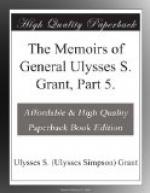Wright’s corps moving in two lines captured the outer rifle-pits in their front, but accomplished nothing more. Smith’s corps also gained the outer rifle-pits in its front. The ground over which this corps (18th) had to move was the most exposed of any over which charges were made. An open plain intervened between the contending forces at this point, which was exposed both to a direct and a cross fire. Smith, however, finding a ravine running towards his front, sufficiently deep to protect men in it from cross fire, and somewhat from a direct fire, put Martindale’s division in it, and with Brooks supporting him on the left and Devens on the right succeeded in gaining the outer—probably picket—rifle-pits. Warren and Burnside also advanced and gained ground—which brought the whole army on one line.
This assault cost us heavily and probably without benefit to compensate: but the enemy was not cheered by the occurrence sufficiently to induce him to take the offensive. In fact, nowhere after the battle of the Wilderness did Lee show any disposition to leave his defences far behind him.
Fighting was substantially over by half-past seven in the morning. At eleven o’clock I started to visit all the corps commanders to see for myself the different positions gained and to get their opinion of the practicability of doing anything more in their respective fronts.
Hancock gave the opinion that in his front the enemy was too strong to make any further assault promise success. Wright thought he could gain the lines of the enemy, but it would require the cooperation of Hancock’s and Smith’s corps. Smith thought a lodgment possible, but was not sanguine: Burnside thought something could be done in his front, but Warren differed. I concluded, therefore to make no more assaults, and a little after twelve directed in the following letter that all offensive action should cease.
Cold harbor, June 3, 1864.-12.30 P.M. Major-general Meade,
Commanding A. P.




